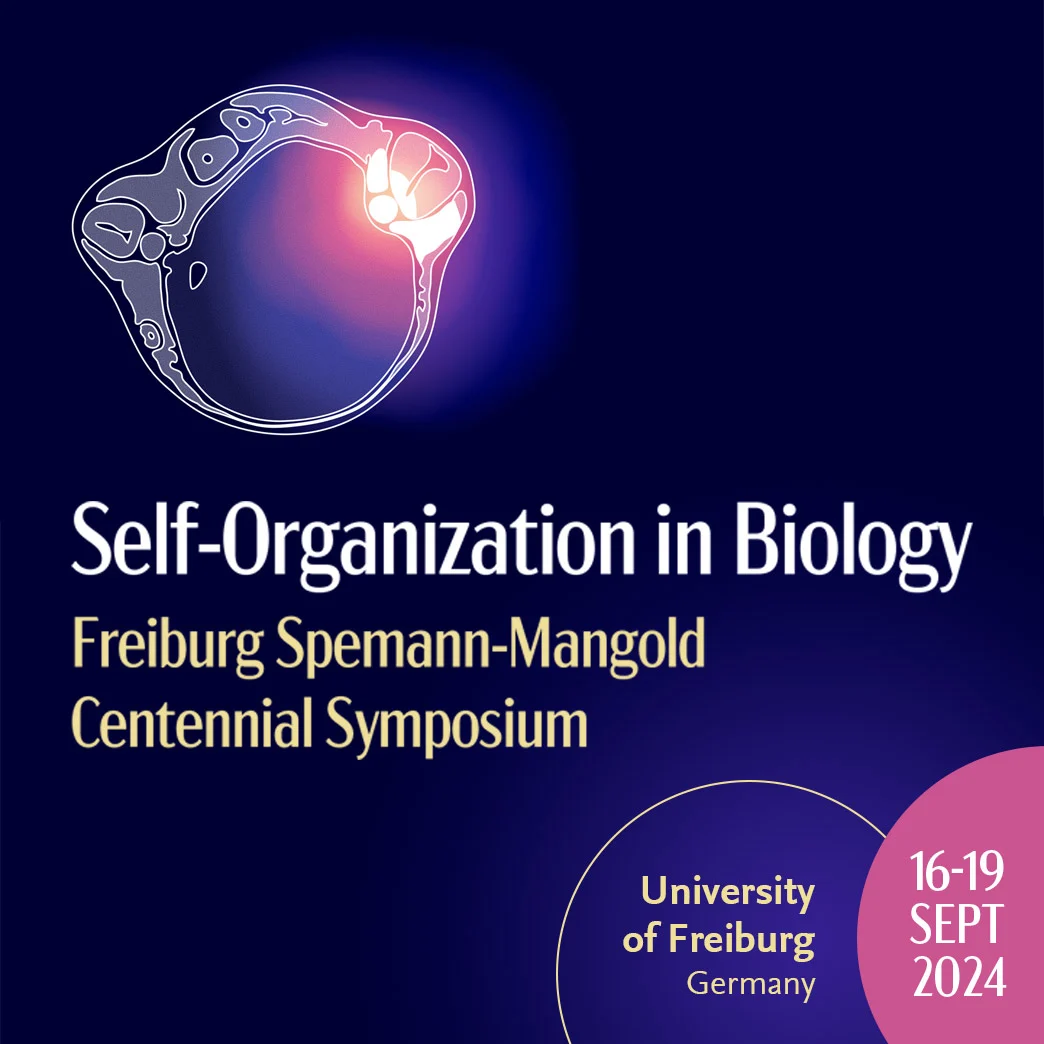Keynote and plenary talks from renowned speakers

Meet the esteemed committee members and speakers participating in the conference.
Unfortunately we don't fully support your browser. If you have the option to, please upgrade to a newer version or use Mozilla Firefox, Microsoft Edge, Google Chrome, or Safari 14 or newer. If you are unable to, and need support, please send us your feedback.
We'd appreciate your feedback.Tell us what you think!
16-19 September 2024 | University of Freiburg, Germany

The Self-Organization in Biology: Freiburg Spemann-Mangold Centennial Symposium celebrates 100 years of scientific advances rooted in Hilde Mangold’s and Hans Spemann’s discovery of the gastrula organizer in vertebrate development, published in 1924 and awarded the Nobel Prize in Physiology or Medicine in 1935.
Join the conversation #spemannmangold2024
The symposium builds a bridge to today’s molecular and cellular understanding self-organization in developing systems, including gastrulation, stem cell organoids, morphogen gradients, invertebrate systems, Evo-Devo, and emerging fields deriving from the discovery of embryonic induction.
The concept of embryonic induction, first demonstrated in the famous gastrula organizer transplantation experiments by Hilde Mangold and Hans Spemann in their 1924 landmark publication and awarded the Nobel Prize in Physiology or Medicine in 1935, has been the most influential discovery promoting 100 years of research into organization phenomena in biology.
This experiment has been the foundation of today’s advanced molecular and cellular level understanding of how patterning and organization of the vertebrate embryo is accomplished.
The symposium will build a bridge over these 100 years, by honoring the original concepts and experiments, but will have a main focus on today’s latest advances towards mechanistic understanding of self-organization during gastrulation, and more general in developing systems.
The scope of the conference ranges from embryonic induction and the gastrula organizer itself to its signaling systems, cell behavior during gastrulation, morphogenesis and pattern formation. We will take an evo-devo look at self-organization to lessons from invertebrate and plant systems.
The conference will link to recent advances on organizing principles in gastruloids and organoids – from stem cells to synthetic organizers.
We encourage active participation in the symposium, and, if registration numbers may exceed symposium capacity, we may preferentially admit registrations with abstract submissions. A limited number of submitted abstracts will be selected for short talks, therefore please indicate if you wish to present an oral presentation.
History of the organizer and of self-organizing systems
The gastrula organizer
Gastrulation cell behavior
Pattern formation
Signaling pathways in self-organizing systems
Self-organization in morphogenesis
Evo-Devo
Organizing organoids and gastruloids
From stem cells to synthetic organizers
Self-organization in development
Plant organizers

Meet the esteemed committee members and speakers participating in the conference.

Discover conference topics and learn about related events. You can participate and submit as many abstracts related to conference topics for review.

Choose from a variety of sponsorship and commercial options to raise your profile and position your company as a thought leader in the community.
Abstract Submission Deadline Extended to : 17th May 2024 : Closed
Author notification deadline: 5 June 2024
Author registration deadline: 21 June 2024
Early registration deadline: 21 June 2024
To celebrate one hundred years of the famous gastrula organizer transplantation experiments published by Hilde Mangold and Hans Spemann in 1924, Cells & Development will publish a Special Issue divided into two parts:
Spemann and Mangold centennial special issue. Part I: historical perspective
Spemann and Mangold centennial special issue. Part II: self-organization in biology
I. Spemann and Mangold centennial special issue. Part I: historical perspective
This special issue of Cells and Development delves into the historical aspects of the seminal Spemann and Mangold experiment, a milestone in developmental biology. The findings revolutionized our understanding of cellular differentiation and embryonic patterning, marking a turning point in the field of developmental biology. It explores the experiment's historical context, its significance, and its enduring impact on the study of cells and development. Contributors to this special issue are outstanding scientists in a wide range of fields from social and historical sciences to developmental biologists, including sociologists and journalists.
Contributions to this special issue are by invitation only, and the resulting volume will be printed and distributed freely during the Freiburg Spemann-Mangold Centennial Symposium.
II. Spemann and Mangold centennial special issue. Part II: self-organization in biology
The famous Spemann and Mangold experiment involved the transplantation of a tiny piece of a newt embryo's dorsal lip to another embryo. This grafting experiment revealed the existence of an organizer region, now known as the Spemann-Mangold organizer, which plays a pivotal role in embryonic development. The findings revolutionized our understanding of cellular differentiation and embryonic patterning, marking a turning point in the field of developmental biology. This special issue of Cells and Development will include original contributions as well as reviews on the topic of self-organization in biology, which will be discussed at the Freiburg Spemann-Mangold Centennial Symposium.
All the speakers at the Freiburg Spemann-Mangold Centennial Symposium will contribute with articles to this special issue making it a memorable collection to celebrate the centennial of this influential experiment.
This special issue will be open to contributions from scientists working on the gastrula organizer, gastrulation cell behaviour, pattern formation, signalling pathways in self-organizing systems, self-organization in morphogenesis, Evo-Devo, organizing organoids and gastruloids, stem cells and synthetic organizers, self-organization in development, plant organizers.
The deadline to submit contributions to this Special Issue is September 2024. Articles will be published online as soon as they are accepted, even before this deadline.
All papers published in this special issue will be freely accessible on a promotional basis for a period of one year.
Cells & Development is an international journal covering the areas of cell biology and developmental biology. In addition to publishing work at the interphase of these two disciplines, we also publish work that is purely cell biology as well as classical developmental biology. C&D is the official journal of The International Society of Developmental Biologists (ISDB) which supports the world-wide community of developmental biologists. Cells & Development will consider papers in any area of cell biology or developmental biology, in any model system like animals and plants, using a variety of approaches, such as cellular, biomechanical, molecular, quantitative, computational and theoretical biology. Areas of particular interest include:
Cell and tissue morphogenesis
Cell adhesion and migration
Cell shape and polarity
Biomechanics
Theoretical modelling of cell and developmental biology
Quantitative biology
Stem cell biology
Cell differentiation
Cell proliferation and cell death
Evo-Devo
Membrane traffic
Metabolic regulation
Organ and organoid development
Regeneration

Cells & Development
